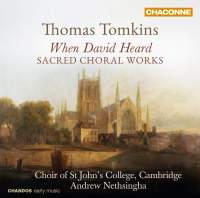Texte paru dans: / Appeared in:
*

International Record Review - (12//2014)
Pour
s'abonner / Subscription information
Chandos
CHAN0804

Code-barres / Barcode : 0095115080429
Consultez toutes les évaluations recensées pour ce cd
~~~~ Reach all the evaluations located for this CD
Thomas Tomkins (1572‑1656) is perhaps best known for his English madrigals (Songs of 4, 5 and 6 Parts, published in 1622), of which, like the composer who along with William Byrd most influenced him, Thomas Morley, he was a master. So perhaps it's fitting this new recording of Tomkins's sacred music by the superb Choir of St John's College, Cambridge, under its charismatic director Andrew Nethsingha, should open with When David heard that Absalom was slain, the five‑part sacred madrigal which was published in the 1622 collection and which is now his most famous anthem. It receives here a tender, solemn performance, the ornate repetitions of 'and thus he said' beautifully setting up the subtle dissonance is first work, which also sets its tone: as Tomkins was, so Nethsingha is: mindful of tradition yet recognizing opportunities for individual expression as they arise. This is evident in the deft managing of Tomkins's textural ebb and flow in the three verse anthems presented ‑ note the unfussy yet powerful gathering of solo voices in the first line of Almighty God, which hast knit together and the adamantine clarity in the ten‑part Behold, I bring you glad tidings. Then there is that wonderful moment in the other full‑verse anthem on the s of 'Oh my son' in the next line.
In many respects, the rest of the programme grows naturally out of the recording, Almighty God, the fountain of all wisdom, where the delicate dissonance of 'thy Son Jesus Christ' is made to render the long (over a minute), luxuriant 'Amen' even more glowing. Finally, there are the movements from five‑part Sixth ‑ relatively modest, chamber‑like ‑ and ten‑part Third ‑ the 'Great' ‑ services. It is in this latter that even when the voices break up into ten genuine parts Nethsingha insists on absolute clarity of diction and coherence of musical logic.
Interestingly, Tomkins, who was organist at Worcester Cathedral until Cromwell's men removed the royalist musician and indeed the cathedral's organ itself in 1646 (he held the post for 50 years), designed the first two manual organ in England, a little over three decades before. This recording thus features three of his pieces for the instrument including the well‑known A Sad Pavan for these distracted times, written in his final decade. As is the case throughout this fine recording, organist Freddie James turns in a stylish, sensitive performance that is faithful to the work's intimate, melancholy nature.
There is but a handful of recordings devoted to Tomkins's sacred music, and of the others the best is 'These Distracted Times' (Obsidian CCLCD702), with David Skinner directing Alimare and the Choir of Sidney Sussex College, Cambridge. There is
little
cross‑over of repertoire, and the effect is very different from that of the
present
recording, because of the
mixed‑voice forces. But they are equally satisfying'! Where the
Obsidian recording has the edge is in the fuller picture one gets of
Tomkins's art, owing to the inclusion of some of the composer's fine chamber
works, performed by Fretwork.
Fermer la fenêtre/Close window
Cliquez l'un ou l'autre
bouton pour découvrir bien d'autres critiques de CD
Click either button for many other reviews


